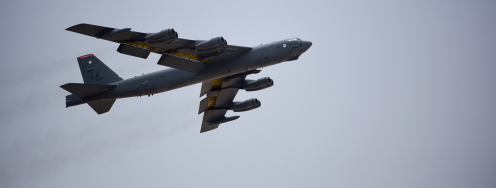$40 Billion Wasted: Missile Defense Test Failures Continue
On the radar: Taxpayers take a bath on missile defense; Next round of Iran talks resume; U.S., Iran and Iraq; How to unwind sanctions; U.S.-U.K. nuclear sharing; Solid rocket fuel concerns; U.S. may not keep N. Korea Envoy position; and World nuclear stockpiles see modest reductions, surge in modernization.
June 16, 2014 | Edited by Lauren Mladenka and Geoff Wilson
Your $40 billion at work - “It was a test of the backbone of the nation's missile defense system,” writes David Willman in a piece for the Los Angeles Times. “Scientists conducting the test at Vandenberg on Sunday, Jan. 31, 2010, had left little to chance. They knew exactly when the target missile would be launched from an atoll in the Marshall Islands 4,900 miles away. They knew its precise dimensions, expected trajectory and speed. Based on this and other data, they had estimated the route the interceptor's heat-seeking ‘kill vehicle’ would have to follow to destroy the target.”
--“Within minutes, the interceptor's three boosters had burned out and fallen away, and the kill vehicle was hurtling through space at 4 miles per second. It was supposed to crash into the mock enemy warhead and obliterate it. It missed. At a cost of about $200 million, the mission had failed. Eleven months later, when the U.S. Missile Defense Agency staged a repeat of the test, it failed, too. The next attempted intercept, launched from Vandenberg on July 5, 2013, also ended in failure. The Ground-based Midcourse Defense system, or GMD, was supposed to protect Americans against a chilling new threat from "rogue states" such as North Korea and Iran. But a decade after it was declared operational, and after $40 billion in spending, the missile shield cannot be relied on, even in carefully scripted tests that are much less challenging than an actual attack would be.”
--“The Missile Defense Agency has conducted 16 tests of the system's ability to intercept a mock enemy warhead. It has failed in eight of them, government records show. Despite years of tinkering and vows to fix technical shortcomings, the system's performance has gotten worse, not better, since testing began in 1999. Of the eight tests held since GMD became operational in 2004, five have been failures. The last successful intercept was on Dec. 5, 2008. Another test is planned at Vandenberg, on the Santa Barbara County coast, later this month.” Read the full report here. http://lat.ms/1lpAot9
Talks resume - “The Obama administration is sending both its second- and third-ranking diplomats to international negotiations on Iran's nuclear program this week, in a sign of the mounting urgency of the talks. The State Department announced that Deputy Secretary of State William J. Burns will join Undersecretary of State Wendy R. Sherman, the chief negotiator, at the planned five-day meeting in Vienna with negotiators for Iran, France, Britain, Germany, Russia and China,” writes Paul Richter for The LA Times.
--“Burns is a respected veteran who was central to the secret U.S.-Iranian back channel that helped reach an interim nuclear deal with Iran last November. In those meetings Burns helped reassure the Iranians that the White House was committed to trying to complete a deal… This week is considered critical in the negotiations. Western officials recognize that major gaps remain in the negotiations, but want to bear down and see if the deal can be completed by next month.” Full piece here. http://lat.ms/1qkqvij
Sticking to the issues - “As they return to nuclear talks in Vienna on Monday, U.S. and Iranian diplomats are taking care to prevent the upheaval in Iraq from creating another complication for their high-priority negotiations,” writes Paul Richter in the Los Angeles Times. However, “Obama administration officials have deflected questions about whether they would cooperate with Iran in the expanding Iraq fight. They've denied that they're talking to the Rouhani government about the issue and stressed that the Iran nuclear negotiations don't take up other subjects.” Full piece here. http://lat.ms/T0TRUS
Tweet - @tparsi: Iraq crisis made clear Iran & US must expand dialogue beyond nuclear. Has also added urgency to meet July 20 deadline @lrozen @julianborger
Teaming up - “The United States is preparing to open a direct dialogue with longtime adversary Iran on security in Iraq and ways to push back Sunni militants who have taken over large areas of the country, the Wall Street Journal reported on Sunday. Citing senior U.S. officials, the newspaper said the dialogue was expected to begin this week. It comes as the United States and other world powers strive for an agreement with Tehran to curb its nuclear program… U.S. officials said it was not certain which diplomatic channel the Obama administration would use to discuss Iraq, the Journal reported. One possibility was through Vienna, the paper said, where senior U.S. and Iranian officials were scheduled to meet with other world powers on Monday to negotiate limits on Iran's nuclear capabilities.” Jim Loney has the story in Reuters. http://yhoo.it/1jtYcX6
Expiring sanctions - “A new paper by a veteran US Iran expert and congressional analyst lays out options for unwinding US sanctions that include initial waivers by President Barack Obama and the 2016 expiration of a key piece of legislation that has impeded foreign investment in Iran’s energy sector,” writes Barbara Slavin in Al-Monitor.
--According to the paper, written by Kenneth Katzman, “the Obama administration ‘might decide to allow the Iran Sanctions Act to sunset’ when it expires on Dec. 31, 2016, shortly before Obama leaves office. Expiration of the act ‘would reopen Iran’s energy sector to unimpeded foreign investment and would enable Iran to begin expanding oil and gas production again after many years of stagnation,’ notes Katzman...He adds that Congress could vote to extend the act, as it has repeatedly done since the law was first passed in 1996, but the president could exercise his veto authority.” http://bit.ly/1lshlP8
Tweet - @barbaraslavin1: #Iran doesn't play #Nigeria #WorldCup until 3 pm Eastern time; so you can come @AtlanticCouncil at 2pm for our #Iran #sanctions event http://bit.ly/1h9DpN2
The extra special relationship - “Official documents show the United States and United Kingdom plan to deepen their cooperation on nuclear warhead designs,” Global Security Newswire reports. “Partially censored papers provided through an open-records request reveal the two longtime military allies' plans to increase collaboration on nuclear weapon work and the sharing of materials essential for the production and retention of warheads… London and Washington are expected to formalize the terms of their enhanced nuclear cooperation in the coming weeks with a quiet signing ceremony in the U.S. capital of an updated Mutual Defense Agreement.”
--“The defense pact enables the United Kingdom to benefit from research and design work done in U.S. atomic weapon laboratories, much of which focuses on ways to ensure a reliable, safe and credible nuclear arsenal absent a return to testing. The Trident weapons deployed on both U.S. Ohio-class and British Vanguard-class ballistic missile submarines have long been assumed to be jointly designed and sustained by the two countries.” Full piece here. http://bit.ly/1omUwOJ
Solid rocket fuel shortage - “In 2016, NASA will decide whether its new boosters will use liquid fuel, solid propellant, or a mix. If they go all or mostly liquid, that’s a potential death blow for domestic solid fuel manufacturing, and the [Navy’s armed Trident D5] is a solid-fuel missile,” writes Sydney j. Freedberg Jr. for Breaking Defense. “This isn’t a problem Benedict or his bosses at the Pentagon can fix by themselves. ‘I don’t think this is an SSP issue, an Navy issue, a Department of Defense issue: This is a national issue,’ Benedict said. ‘If you want to have that capability, it should not be on SSP’s back’ to keep the industry alive until someone else decides to start buying again.”
--“That sounds awfully similar to the argument that Benedict’s shipbuilding colleagues make about the submarine that will carry the Tridents when the current Ohio-class SSBN becomes too old to operate in the 2030s: The Ohio Replacement Program (formerly SSBN(X)) is too expensive and too important for the Navy budget to have to carry alone, they argue. Congressional supporters are moving to set up a special account for ORP outside the Navy budget, but actually finding the funding will be much harder.” Read the full report here. http://bit.ly/1n4eEyA
Tweet - @FAScientists: American scientists & impact on #nuclear weapons policy: http://bit.ly/1p9nHRi
Reassignment - “The United States is expected to reassign its special envoy on North Korea issues and may not replace him,” Global Security Newswire reports. “Glyn Davies, the current U.S. special representative for North Korea policy, is seen as a top candidate for the post of U.S. ambassador to Thailand… Davies, who has served as special envoy since early 2012, is anticipated to be reassigned in the coming months. However, it is not clear that the Obama administration will retain the diplomatic post of special envoy for North Korea following years of zero progress on the denuclearization front.” Read the full article here. http://bit.ly/1q42YzR
Nukes by the numbers - Overall inventories of nuclear weapons “are declining, primarily due to the United States and Russia continuing the drawdown of their nuclear arsenals as a result of the Treaty on Measures for the Further Reduction and Limitation of Strategic Offensive Arms (New START) and unilateral reductions. But the pace of reductions appears to be slowing compared with a decade ago. At the same time, all the nuclear-armed states are modernizing their remaining nuclear forces and appear determined to retain sizeable nuclear arsenals for the foreseeable future.”
--“The USA and Russia continue to reduce their arsenals but at a slower pace than a decade ago and have extensive modernization programs underway for their remaining nuclear delivery systems, warheads, and production facilities. The nuclear arsenals of the other smaller nuclear-armed states are considerably smaller, but all are either developing or deploying new weapons or have announced their intention to do so.” Get the full report from the Stockholm International Peace Research Institute here. http://bit.ly/SNznyk
Quick-hit:
--“No, Obama didn’t lose Iraq” by Colin Kahl for Politicco. http://politi.co/1iBcGnW
Events:
--“India’s Nuclear Policy and Regional Stability.” Discussion with Michael Krepon, Lt. Gen. Vinay Shankar (ret.), Vice Adm. A.K. Singh (ret.), Joshua White, Vikram Singh, and Jayant Prasad. June 16 from 12:30 to 3:00 at the Stimson Center, 1111 19th St. NW. RSVP here. http://bit.ly/1s0k0Db
--“How to Unwind Iran Nuclear Sanctions.” Discussion with Kenneth Katzman and Cornelius Adebahr; moderated by Barbara Slavin. June 16 at 2:00 at The Atlantic Council, 1030 15th St. NW, 12th Floor (West Tower). RSVP here. http://bit.ly/1h9DpN2
--“The Iran Nuclear Deal and the Impacts on its Neighbors.” Discussion with Abdullah Baadood, Salah Elzein, Bijan Khajehpour, Afshin Molavi, David Ottaway, and Marina Ottaway. June 23 from 9:30-12:00 at the Wilson Center, 5th floor, Reagan Building, 1300 Pennsylvania Ave. NW. RSVP here. http://bit.ly/1lsjx99
--“PONI Breakfast with Kirk Donald.” Breakfast discussion with former National Nuclear Security Administration Deputy Administrator Kirk Donald. June 26 from 9:00-10:30 at the Center for Strategic and International Studies, 1616 Rhode Island Ave. NW. RSVP here. http://bit.ly/1owrOLA
--“Toward a Comprehensive, Effective Nuclear Deal with Iran?” Discussion with Daryl Kimball, Greg Thielmann, Kelsey Davenport, and Frank von Hippel. June 26 from 10:00-12:00 at the Carnegie Endowment for International Peace, Choate Room, 1779 Massachusetts Ave. NW. RSVP here. http://bit.ly/1p9kz8a
--“Aegis Sea-Based Missile Defense: Present Status and Future Recommendations.” Discussion with John James, Rear Adm. James Kilby, Ron O’Rourke, Henry Cooper, and Robert Soofer. June 26 from 12:00-2:00 at SVC 201-00, Capitol Visitor Center. RSVP by email to Polly Parke at pparke@ifpa.org



